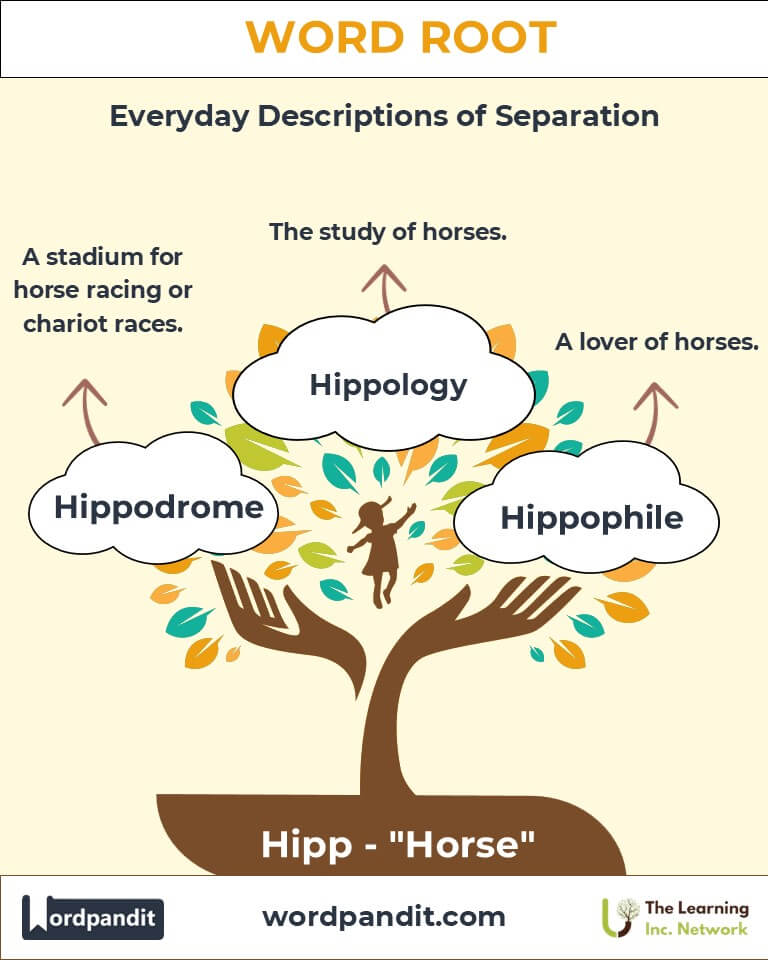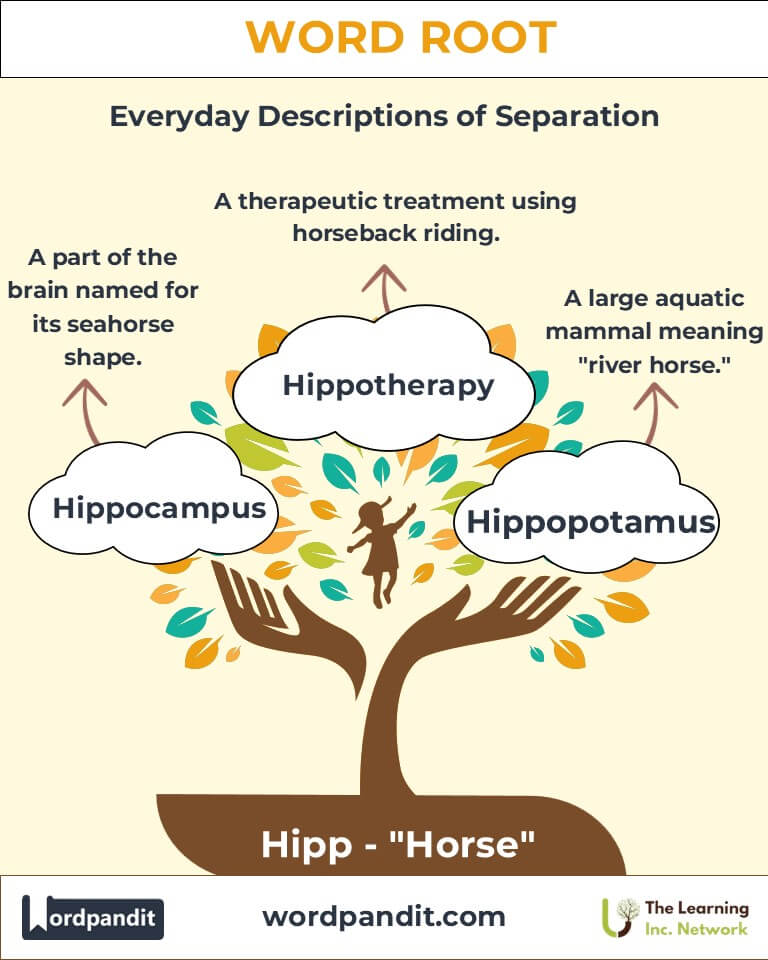Hipp: The Root of Horse Power in Language and Culture
Byline: Explore the fascinating journey of the root "Hipp," derived from Greek and symbolizing "horse." From ancient racetracks to majestic animals immortalized in language, words like "hippodrome" and "hippopotamus" show how this root galloped into various fields and vocabularies, leaving an enduring mark.

Table of Contents
- Introduction: The Essence of "Hipp"
- Etymology and Historical Journey
- Mnemonic: Unlocking the Power of "Hipp"
- Common "Hipp"-Related Terms
- "Hipp" Through Time
- "Hipp" in Specialized Fields
- Illustrative Story: "Hipp" in Action
- Cultural Significance of the "Hipp" Root
- The "Hipp" Family Tree
- FAQs about the "Hipp" Word Root
- Test Your Knowledge: "Hipp" Mastery Quiz
- Conclusion: The Living Legacy of "Hipp"
Introduction: The Essence of "Hipp"
The word root "Hipp" (pronounced "hip") conjures images of majestic steeds galloping through history. Originating from the Greek word hippos, meaning "horse," this root has given rise to terms like "hippodrome" (a horse-racing arena) and "hippopotamus" (literally, "river horse"). Horses, revered for their strength, speed, and grace, have been integral to human civilization, and the root "Hipp" captures their cultural and linguistic significance.

Etymology and Historical Journey
The root "Hipp" traces its origins to ancient Greece, where hippos was synonymous with horses, a vital part of life, war, and mythology. In classical times, hippodromes served as grand arenas for chariot races, a hallmark of Greek and Roman entertainment. The word "hippopotamus," a blend of hippos (horse) and potamos (river), reflected the Greeks' imaginative comparison of this massive creature to a horse. Over centuries, "Hipp" terms migrated into English, retaining their equestrian essence.
Mnemonic: Unlocking the Power of "Hipp"
Visualize a spirited horse leaping through a giant arena labeled "HIPP." Above, a hippopotamus dives gracefully into a river, blending the themes of land and water.
Mnemonic Device: "Horses race in the hippodrome while river horses (hippopotamuses) swim nearby."
Common "Hipp"-Related Terms
- Hippodrome (hip-oh-drohm): A stadium for horse racing or chariot races.
Example: "The ancient hippodrome in Olympia was a hub of excitement during the Greek games." - Hippopotamus (hip-oh-pot-uh-muhs): A large, aquatic mammal whose name means "river horse."
Example: "Hippopotamuses spend most of their time in water to stay cool." - Hippology (hip-ol-uh-jee): The study of horses.
Example: "She pursued hippology to understand equine behavior better." - Hippophile (hip-oh-file): A lover of horses.
Example: "As a hippophile, she spent weekends at the stables caring for horses." - Hippotherapy (hip-oh-ther-uh-pee): A therapeutic treatment using horseback riding.
Example: "Hippotherapy improved her balance and coordination after the accident."
"Hipp" Through Time
- Ancient Hippodromes: These grand arenas were cultural centers, reflecting ancient societies' passion for horse-related sports.
- Hippopotamus in Medieval Bestiaries: The term evolved to describe the semi-aquatic animal admired for its strength, blending the equestrian and aquatic worlds.
"Hipp" in Specialized Fields
- Medicine:
Hippotherapy integrates horseback riding into treatments for physical and neurological conditions, fostering healing through movement and rhythm. - Biology:
The term hippocampus (a part of the brain resembling a seahorse) reflects how language draws from "Hipp" imagery. - Sports History:
Ancient hippodromes highlight the cultural importance of horse racing and chariot events.
Illustrative Story: "Hipp" in Action
In ancient Athens, a young boy named Leander dreamt of racing chariots in the grand hippodrome. His family raised a spirited mare, and he named her Galene. Over years of training, Leander and Galene became a formidable duo. When the day of the race arrived, they competed fiercely, securing victory and leaving the crowd in awe. The hippodrome roared with cheers, symbolizing the enduring bond between humans and horses.
Cultural Significance of the "Hipp" Root
Horses have symbolized power, freedom, and nobility across cultures. From Greek gods like Poseidon, who created horses, to the chivalric knights of medieval Europe, the root "Hipp" reflects humanity's admiration for these creatures. Today, terms like "hippotherapy" highlight horses' continued role in healing and therapy.

The "Hipp" Family Tree
- Equi- (Latin: horse):
Examples: Equestrian (related to horseback riding), Equine (pertaining to horses). - Potamos (Greek: river):
Examples: Hippopotamus (river horse). - Caballus (Latin: horse):
Examples: Cavalier (a horseman, often a knight).

FAQs About the Hipp Word Root
Q: What does "Hipp" mean?
A: The root "Hipp" originates from the Greek word hippos, meaning "horse." It is the foundation of several words that relate to horses, such as "hippodrome" (a horse racing arena) and "hippophile" (a lover of horses).
Q: Why is a hippopotamus called a "river horse"?
A: The term "hippopotamus" combines the Greek words hippos (horse) and potamos (river). Ancient Greeks, observing the large, semi-aquatic mammal's behavior of spending much of its time in water and its galloping-like movements on land, creatively likened it to a horse living in a river.
Q: What is a hippodrome?
A: A "hippodrome" is an ancient stadium or arena designed for horse and chariot racing. It was a prominent feature of Greek and Roman civilizations, serving as a hub for entertainment and competitive events.
Q: What is hippology, and why is it important?
A: Hippology is the study of horses, including their anatomy, behavior, history, and care. This field is vital for veterinarians, trainers, and equestrians, as it helps improve the health and well-being of horses and enhances human-horse interactions.
Q: What is the hippocampus, and how does it relate to "Hipp"?
A: The hippocampus is a region of the brain essential for memory and navigation. Its name derives from its resemblance to a seahorse (hippos meaning horse and kampos meaning sea monster). This term reflects how the "Hipp" root has extended beyond its literal equestrian origins into other areas of study.
Q: What role do horses play in modern therapeutic practices like hippotherapy?
A: Hippotherapy uses horseback riding as a therapeutic tool for people with physical, neurological, or emotional challenges. The movement of the horse stimulates muscles, balance, and coordination, offering a unique form of therapy that enhances rehabilitation efforts.
Q: How has the root "Hipp" influenced modern language?
A: The root "Hipp" appears in various fields, from biology (hippocampus) to recreation (hippodrome). Its enduring presence reflects the historical and cultural importance of horses in transportation, sports, and therapy.
Test Your Knowledge: Hipp Mastery Quiz
1. What does the root "Hipp" mean?
2. What is a hippodrome used for?
3. Why is a hippopotamus called a "river horse"?
4. What does "hippophile" mean?
5. What is the hippocampus?
Conclusion: The Living Legacy of "Hipp"
The root "Hipp" captures humanity’s enduring bond with horses, from ancient hippodromes to modern therapeutic practices. These creatures, vital to our past and present, inspire language, culture, and innovation. As we explore terms rooted in "Hipp," we uncover a legacy of strength, speed, and grace galloping through history. Let the power of "Hipp" remind us of the profound connections we share with these majestic animals.












